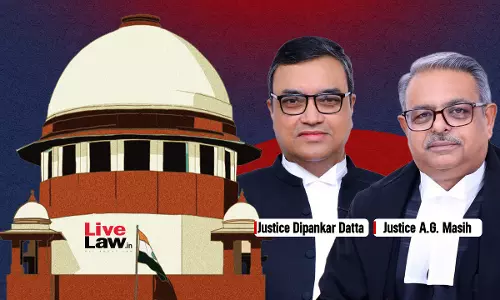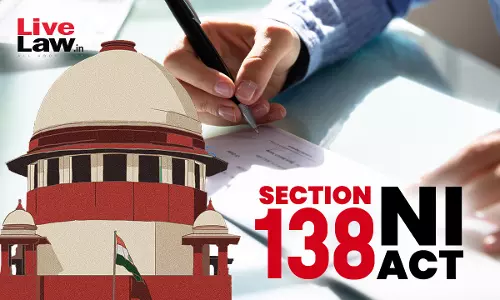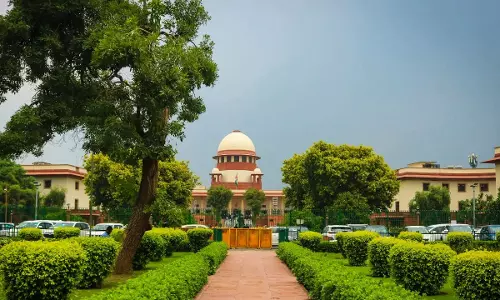Supreme court
Supreme Court Notes Conflict Between Forest Rights Act & Forest Conservation Act On Allowing Houses For Tribes; Seeks Union's Stance
The Supreme Court has directed the Union Government to file an affidavit within four weeks clarifying the scope, method, and manner of permitting construction of dwelling houses under the Forest Rights Act, 2006 (“FRA”), in a manner consistent with the Forest (Conservation) Act, 1980 (“FCA”). While the FRA guarantees forest dwellers a 'pucca house,' the FCA imposes restrictions on such permanent constructions within forest areas.Opining that the Forest Conservation Act should not prohibit the...
Supreme Court Weekly Digest September [15 - 23, 2025]
Airports Authorities of India (AAI) - levy of service tax on services rendered in handling export cargo – Held, service tax on services rendered in handling export cargo, ruling that such services fall within the ambit of 'taxable services' under the Finance Act, 1994 - While 'handling of export cargo' is excluded from the definition of 'cargo handling service' under Section 65(23) of...
Supreme Court Half Yearly Digest 2025: Service Law
Administrative Tribunals Act, 1985; Section 20 - Time-Barred Claims - A time-barred service dispute cannot be brought within the limitation period by filing a belated representation. When a government servant is aggrieved by a denial of a benefit, which is not based on a formal order, then a representation must be filed within a reasonable time. The cause of action to approach...
Armed Forces Tribunal Empowered To Modify Court-Martial Convictions And Impose Lesser Penalties : Supreme Court
The Supreme Court on Friday (October 10) observed that the Armed Forces Tribunal (“AFT”) under the Armed Forces Tribunal Act, 2007 (“Act”) is empowered to substitute the findings of the Court Martial if its findings were excessive, illegal or unjust. “Thus, under Section 15(6) (a) & (b) of the 2007 Act, the Tribunal is empowered to substitute the finding of Court Martial which includes the disciplinary proceedings under the Act and also to interfere with the sentence if the same is found...
Juvenile Justice Act 2000 Applies Retrospectively : Supreme Court Orders Release Of Convict Who Was Juvenile When Crime Was Committed In 1981
The Supreme Court on Thursday (October 9) ordered the release of the murder convict under the Juvenile Justice Act, 2000, after finding he was a juvenile at the time of the commission of the offence in 1981. The Court held that the JJ Act is retrospective in operation, and applies to offences pre-dated the enforcement of the JJ Act, 2000.The Court rejected the State's argument that since...
Stamp Act | Stamp Duty Determined By Instruments' Legal Character, Not Its Nomenclature: Supreme Court
The Supreme Court held that while determining the chargeability of the Stamp Duty, the decisive factor is to ascertain the true legal character of the instrument, not the nomenclature assigned to the instrument. A bench of Justices Ahsanuddin Amanullah and Prashant Kumar Mishra dismissed an appeal filed by a company that attempted to color a mortgage deed like a security bond to attract...
S.138 NI Act | Cheque Dishonour Complaint Maintainable Against Trustee Without Arraying Trust As Accused : Supreme Court
The Supreme Court on Thursday (October 9) observed that a cheque dishonor complaint would be maintainable against a trustee, who has signed a cheque on the Trust's behalf, without arraying the Trust as an accused. The Court reasoned that since a Trust is not a juristic person, and neither sues nor is sued, therefore, trustees responsible for day to day affairs of the Trust would be held...
Advocates Cannot Claim Exclusive Quota In District Judge Direct Recruitment : Supreme Court
The Supreme Court Constitution Bench today held that the 25% quota set for direct recruitment for the post of district judges is not exclusively for the candidates from the bar. The bench of Chief Justice of India BR Gavai, Justices MM Sundresh, Aravind Kumar, SC Sharma and K Vinod Chandran held that : "We are also not inclined to accept the contention on behalf of the respondents that 25%...
Judicial Officers' Experience Greater Than That Of Practising Advocates: Supreme Court In District Judge Recruitment Case
In a significant ruling, the Supreme Court held that in-service judicial officers can apply for direct recruitment as District Judges if they have a combined experience of seven years as an advocate and/or in service. The Court also observed that the experience gained by a judicial officer is greater than that of a practising advocate.The judgment authored by Chief Justice of India BR Gavai...




![Supreme Court Weekly Digest September [15 - 23, 2025] Supreme Court Weekly Digest September [15 - 23, 2025]](https://www-livelaw-in.demo.remotlog.com/h-upload/2025/08/27/500x300_617534-supreme-court-weekly-digest.webp)









